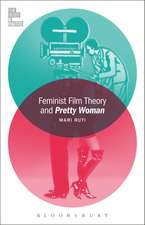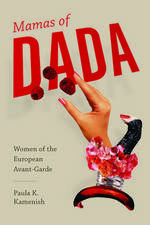Marxist Film Theory and Fight Club: Film Theory in Practice
Autor Anna Kornbluhen Limba Engleză Paperback – mai 2019
| Toate formatele și edițiile | Preț | Express |
|---|---|---|
| Paperback (1) | 126.35 lei 6-8 săpt. | +39.05 lei 5-11 zile |
| Bloomsbury Publishing – mai 2019 | 126.35 lei 6-8 săpt. | +39.05 lei 5-11 zile |
| Hardback (1) | 434.11 lei 6-8 săpt. | |
| Bloomsbury Publishing – mai 2019 | 434.11 lei 6-8 săpt. |
Preț: 126.35 lei
Preț vechi: 154.94 lei
-18% Nou
Puncte Express: 190
Preț estimativ în valută:
24.18€ • 25.15$ • 19.96£
24.18€ • 25.15$ • 19.96£
Carte tipărită la comandă
Livrare economică 14-28 aprilie
Livrare express 08-14 martie pentru 49.04 lei
Preluare comenzi: 021 569.72.76
Specificații
ISBN-13: 9781501347306
ISBN-10: 1501347306
Pagini: 200
Dimensiuni: 127 x 197 x 36 mm
Greutate: 0.27 kg
Editura: Bloomsbury Publishing
Colecția Bloomsbury Academic
Seria Film Theory in Practice
Locul publicării:New York, United States
ISBN-10: 1501347306
Pagini: 200
Dimensiuni: 127 x 197 x 36 mm
Greutate: 0.27 kg
Editura: Bloomsbury Publishing
Colecția Bloomsbury Academic
Seria Film Theory in Practice
Locul publicării:New York, United States
Caracteristici
Explains Marxist film theory through three key concepts-the mode of production, ideology, and mediation
Notă biografică
Anna Kornbluh is Associate Professor of English at the University of Illinois, Chicago, US. She is the author of Realizing Capital (2013), and her articles on Marxist aesthetics have appeared in Mediations, Novel, the LARB, Understanding Film: Marxist Perspectives, Lacan & Contemporary Cinema, and the Bloomsbury Companion to Marx.
Cuprins
AcknowledgementsIntroductionPart One: Marxist Film TheoryPart Two: Marxist Film Theory and Fight ClubConclusionFurther ReadingNotesIndex
Recenzii
[An] accomplished work of scholarship about an acclaimed film ... Analysing Fight Club helps us understand Marxist ideas about the violent, spiritually alienating world we live in ... Kornbluh's crash course in Marxism is admirably clear without being reductive.
I would recommend it to anyone looking for a well-written introduction to Marxism, ideology, and aesthetics.
A serious book that will benefit both those interested in Marxism itself and those whose interests lie within film studies more generally ... It is worthwhile for the reader to discover for themselves the richness of Marxist film theory explored in the book.
Kornbluh has devised a remarkable two-fisted engine that examines simultaneously and in turns Marxist film theory and Fight Club. She offers a rigorous and highly original analysis of the film, in which cinematic form and economic circumstances vie with and outstrip each other, and a superb demonstration of the dialectic at work.
"The first rule of Fight Club is: You do not talk about Fight Club." So, what's the first rule of Marxist film theory? If you or Anna Kornbluh can't talk about that either, her short sharp introduction nonetheless offers an expert account of what Marxism is and why-maybe more than ever-it matters. Moving elegantly between different theories of film and a film that does the work of theory, she both explains how several modes of Marxist analysis work and makes a powerful case for Marxism's status not as one method among many but rather as our best and maybe last chance to engage and to engage critically with the forms of a world we must find wanting.
I would recommend it to anyone looking for a well-written introduction to Marxism, ideology, and aesthetics.
A serious book that will benefit both those interested in Marxism itself and those whose interests lie within film studies more generally ... It is worthwhile for the reader to discover for themselves the richness of Marxist film theory explored in the book.
Kornbluh has devised a remarkable two-fisted engine that examines simultaneously and in turns Marxist film theory and Fight Club. She offers a rigorous and highly original analysis of the film, in which cinematic form and economic circumstances vie with and outstrip each other, and a superb demonstration of the dialectic at work.
"The first rule of Fight Club is: You do not talk about Fight Club." So, what's the first rule of Marxist film theory? If you or Anna Kornbluh can't talk about that either, her short sharp introduction nonetheless offers an expert account of what Marxism is and why-maybe more than ever-it matters. Moving elegantly between different theories of film and a film that does the work of theory, she both explains how several modes of Marxist analysis work and makes a powerful case for Marxism's status not as one method among many but rather as our best and maybe last chance to engage and to engage critically with the forms of a world we must find wanting.
































